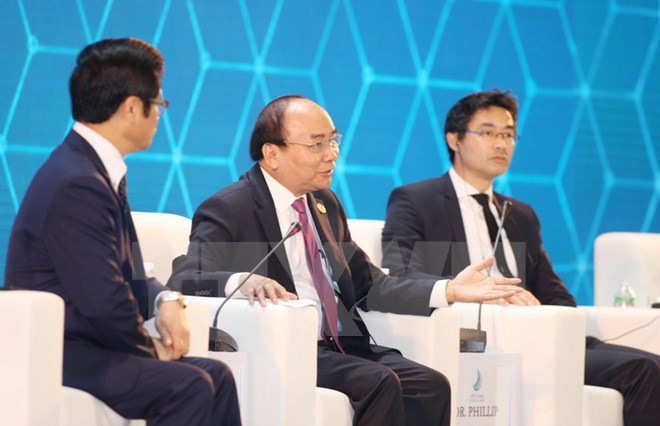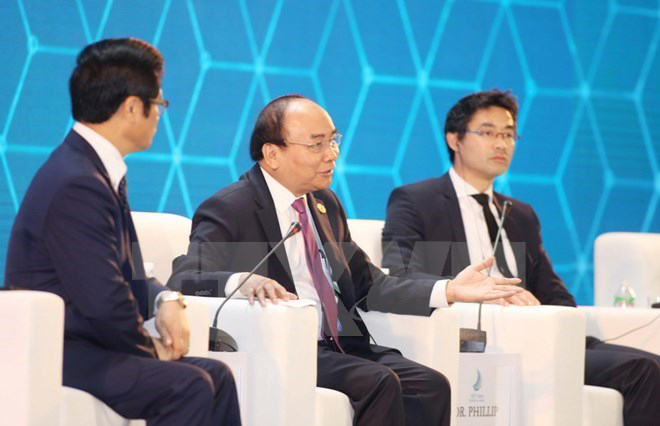



Prime Minister Nguyen Xuan Phuc (C) answers questions raised by enterprises at the Vietnam Business Summit (Source: VNA)
Following is the full text
of the article.
"On 15 November 1998, Vietnam joined the Asia-Pacific Economic Cooperation
(APEC) forum. This is a milestone in the country’s comprehensive development,
laying the foundation for Vietnam’s dynamic and proactive international
integration.
"Thanks to reforms over the last 30 years, Vietnamese economic growth has grown
nearly 7 percent each year, much higher than global growth rates. Until now,
Vietnam has attracted 310 billion USD of FDI, in which 165 billion USD was
disbursed. 80 percent of FDI in Vietnam comes from within the Asia-Pacific
region. Vietnam has established 26 strategic and comprehensive partnerships
with other countries, including major economies in the Asia-Pacific and ASEAN.
Vietnam has 16 FTAs either signed or under negotiation, clearly showing a
strong and consistent policy to deepen international integration and further
promote trade liberalisation in the region and the world.
"We view that reforms to better tap internal resources will be the most
important factor to national prosperity. Given the globalisation and the forth
industrial revolution, the Vietnamese Government, an enabling government,
commits to introduce flexible management mechanisms and promote transparent
market access, advanced labour standards, legitimate business interests and
unceasing innovation. Policy development must reflect the real needs, the trend
of technology and globalisation to be adaptable to new business models as well
as the demand to improve the economy’s competitiveness and comparative
advantages in the regional and global market. According to the World Bank in
its October 2017 report, Vietnam has increased its ranking by 14 notches in
terms of Doing Business index to 68 out of 190 countries. The economy has
jumped up by 5 notches in terms of the Global Competitive Index to 55 out of
137 countries according to WEF report in September 2017.
"In designing its national development strategy, Vietnam has emphasised the
role of the private sector as an important driver of the economy. Accordingly,
the Government commits to take action to enhance competitive advantages,
including: institutions and policies; infrastructure; sound financial systems;
education reform; improving the quality of human resources; enhancing
healthcare services; health and social insurance; and investing in basic
research, to name a few. We believe that we will realise the target of one
million businesses in 2020 and bring the Vietnamese private sector, along with
other economic sectors, to a new height, with the competitiveness and ability
to integrate at the regional and global level.
"Additionally, Vietnam also actively seeks her own solutions to address issues
that hinder the international integration process, including tax evasion, price
transfer, outdated technologies, protectionism and terrorism among others. At
the same time, we are proactively implementing global agreements on sustainable
development and climate change, thus making substantive contributions to
building and influencing multilateral mechanisms, in particular Asia-Pacific
regional cooperation mechanisms.
"We are seeing an emerging trend in Vietnam: the shift from a GDP-centric
growth model to one based on quality, inclusive and sustainable growth.
Notably, for Vietnam, implementation of the Sustainable Development Goals
(SDGs) and its commitments to the COP-21 Paris Agreement on limiting emission
as well as the protection of the environment, are both measures of, and drivers
for, development in the coming decades.
"The air of reform is now being strongly felt across the Pacific Rim and given
the importance of APEC in the region, its member economies will play an
integral role in shaping regional economic and development achievements in the
21st century. Accordingly, we need to look to the future and start building a
new vision for the APEC framework today. The framework needs to consider
economic cooperation along with cooperation in non-economic areas, namely
culture, the environment, science and technology and education for instance, in
which human resource development takes the center stage and will be the driver
that decides new cooperation frameworks and structures. In other words, APEC
needs to play a leadership role in establishing the new international economic
cooperation framework with a new governance model, a new agenda and a new
cooperative architecture.
"Within the context of APEC, the rise of some economies should not be a threat,
but instead be an opportunity to build good partnerships, provide bright
inspiration and share useful lessons for other countries and economies on the
road to success.
"Against the backdrop of emerging economic cooperation initiatives, forums and
frameworks, APEC needs to build an identity of its own, a mechanism to reach a
high unanimity within its members. Certain disputes and challenges to the
environment and energy, and several others have yet been settled. Given this
reality, all APEC members needs to work together to come up with innovative
approaches to establish a unity in diversity that is constructive, equitable,
mutually beneficial and in line with international law.
"An united, peaceful, prosperous Asia-Pacific for sustainable development needs
to be the common goal and responsibility that requires the united and joint
efforts of all APEC economies, large or small, developed or developing, in the
Pacific Rim.
"During the coming days, Vietnam welcomes Economic Leaders from all APEC
economies to the APEC Economic Leaders' Week, held in Da Nang. This is an
important opportunity for Vietnam to further promote the trade liberalisation
process, and for member economies to better understand the Vietnamese people
and business climate.
"It is our hope that, on this occasion, through your wisdom and vision, the
economic leaders of the 21 APEC member economies will find the best solutions
to create new dynamism, foster a shared future together.”
Source: VNA